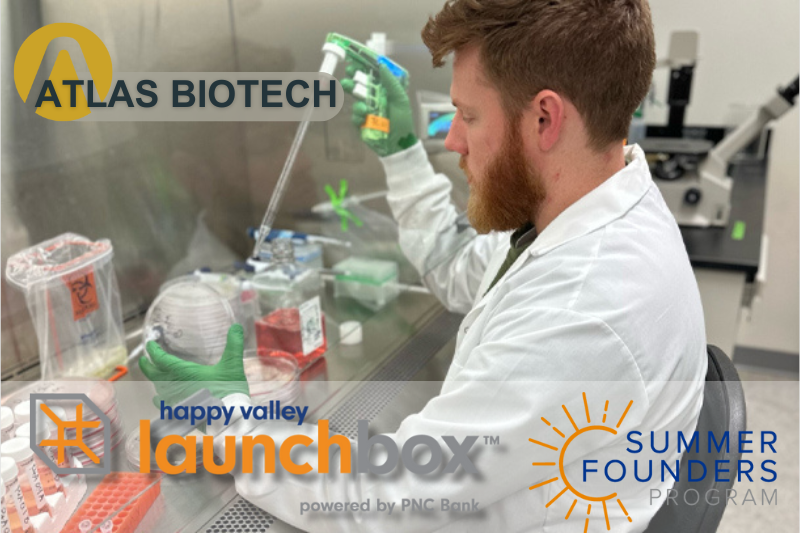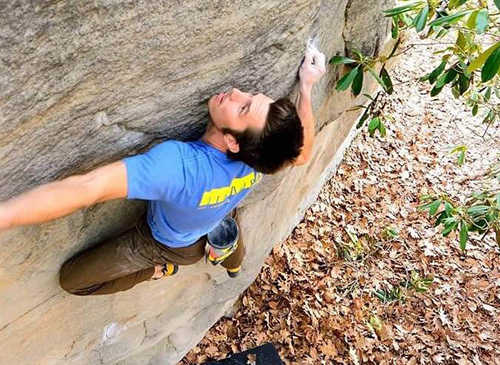by Holly Riddle
 Penn State biomedical engineering doctoral candidate Josh Reynolds
Penn State biomedical engineering doctoral candidate Josh Reynolds
Each year, the Invent Penn State Summer Founders Program welcomes a handful of startups to participate in a one-of-a-kind entrepreneurial crash course. Over 13 weeks, startup founders work full-time to take their ventures to the next level, enjoying a range of Invent Penn State and Happy Valley LaunchBox powered by PNC Bank resources: a $15,000 grant for each startup, coaching sessions, intern assistance and more.
We’re covering a few of the startups participating in the 2024 Summer Founders Program and, in fact, you may have already met one of them, if you caught our recent coverage of Saveware, a startup using AI to help businesses optimize sales tax refunds.
Today, we’re looking at Atlas Biotech, a startup led by biomedical engineering doctoral candidate Joshua Reynolds. Reynolds participated in the HappyValley LaunchBox FastTrack Accelerator program last fall and, just last week, he received formal notice that Atlas Biotech had received a $2.4 million grant from the NCI. In other words, this is one startup poised for success.
Tell us about what led you to create Atlas Biotech.
I’ve been at Penn State for a while. I’m in the end of my seventh year. I did a master’s in biomedical engineering and then stuck around to do a PhD. I’ve been working in Dr. Justin Pritchard’s lab on campus, co-advised by Nikolay Dokholyan…in Hershey. About a year ago, we were working on this platform that can detect drug resistance to existing cancer therapeutics. We started thinking about how we could use that to try and predict resistance before we give drugs to a patient, and see if we could maybe help do a better job of selecting drugs for clinical trials and have more successful, more efficacious clinical trials. That was the impetus.
Did you always think you would end up starting a company, as you were getting your master’s PhD?
Definitely not. I think a lot of people…start out thinking academia is so exciting… You become pretty quickly disillusioned with the system, because it’s very challenging to navigate and it’s very competitive for grants, and it’s taxing. I learned pretty quickly on that I did not want to do academia, so I was looking at working in industry, trying to find a job somewhere at a company doing something cool.
About a year ago…I got engaged and my fiancé has a couple years left in her PhD program, so I was like, ‘Hey, I’m going to be around a while. Why not look at what we can do here?’ It worked out nicely. There was this opportunity for early career academics to get funding for entrepreneurship, and I’ve always been interested in entrepreneurship…
So, what does Atlas Biotech do, in the simplest terms?
Our primary goal is to help pharmaceutical companies pick the drugs that they want to take to clinical trials and do a better job having successful clinical trials. That’s the primary goal, with the ultimate objective of getting better medicine to patients, faster.
The clinical trial success rate right now is really poor. It’s about a 5–10% success rate in clinical trials. There’s a lot of room for improvement. That’s where we really see the value prop for companies… We have these assays, these screens, we’re developing that we’re hoping can do a better job helping people pick the more successful drugs prior to putting them into people. That’s the point at which there’s no going back.
Why was this in particular something you wanted to pursue? Why were you the right person for the job?
I went to Texas A&M for my undergrad, studying neuroscience. My grandfather passed away from lymphoma when I was in my junior year there, and that hit me pretty hard. I think [it] really gave me some perspective on how big of an issue cancer is. It’s impacted almost every single person I know. So, that motivated me. I don’t think I knew, at the time, consciously, that it did, but when I was looking for programs for a master’s or PhD, I was looking at cancer programs and people that were studying different forms of cancer.
I’ve been working for, I think, five years at this point on this specific technology, and it’s been an endeavor, but we think we have something really useful.
That’s how I ended up working on it for my master’s, and [Pritchard’s lab] really focuses a lot on drug resistance. That’s what my thesis is on — characterizing and trying to study and overcome drug resistance in cancer, because that’s the primary reason treatments fail and people pass away: drug resistance.
I’ve been working for, I think, five years at this point on this specific technology, and it’s been an endeavor, but we think we have something really useful.
What happens after the Summer Founders program ends? Where does the startup go from there?
The [NCI] grant is for three years, so that’s a three-year runway to get the technology scaled up and see how it goes, try to engage potential clients and build up a customer base. That’s basically my next three years.
In parallel, I do want to develop other technologies and try to identify market needs, and then meet those with new technologies… Developing these technologies obviously takes years, but I think we’re at a good point. Given the state of other technologies I’ve heard about in this kind of funding program, we’ re near the end of the validation of our tech… I’m looking to have commercial sales in the next two years, as my goal.
Any advice for other Happy Valley startups?
If you have an idea, something that you’re excited about, go for it. Go talk to the people at the LaunchBox. They’re excited to help. That’s their job. They live for that. I was overwhelmed with how encouraging and supportive everyone there was…Talk to one of the advisors there, and just see what they think. I’m sure that you’ll be supported and told the best path forward.
Stay tuned for further coverage of this year’s Summer Founders program startups in the weeks ahead!






